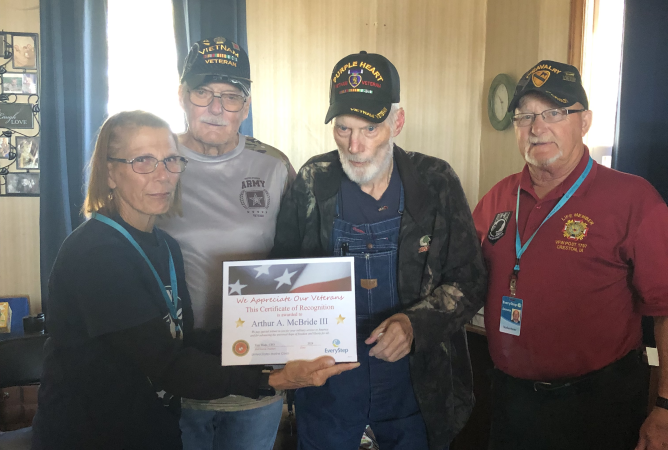November 21, 2024
Vietnam Purple Heart Recipient Mick McBride Honored

Marine Corps veteran Arthur “Mick” McBride III was honored for his military service October 25 during a “pinning” ceremony arranged by the EveryStep Hospice team in Mount Ayr. EveryStep staff and veteran volunteers, and a houseful of friends and family gathered in Mick’s Decatur City home, where he is receiving care from EveryStep Hospice.
“I was overwhelmed — just overwhelmed with joy. It was very emotional. I was humbled and honored and just about every good word you could use,” says Mick. “It was a beautiful ceremony. They gave me a nice plaque and a beautiful quilt. All my family was there — all three of my kids made it.”
Mick was born in Burbank, California and moved to Iowa when he was 5 years old. In 1966 at the age 18, Mick enlisted in the Marines and was stationed at the Marine Corps Air Station in Yuma, Arizona. He met his wife, Brenda, in March of 1968 and they married just a month later.
Shortly after their marriage, Mick was sent to Japan and then Vietnam where he was a member of a “crash crew,” responsible for putting out the flames when jets would catch on fire while landing on the runway. He spent time near the Vietnam Demilitarized Zone (DMZ) in Denyong, Quang Tri and Dongh. Mick served from June to September. During those months, he was exposed to Agent Orange and suffered the injury that earned him the Purple Heart.
Mick was traveling in an Otter, a tank-like vehicle used by the Marine Corps during the war because its light weight and 20-inch-wide track allowed it to go into the soft soils surrounding the rice paddies of Vietnam.
“The Otter ahead hit a mine,” remembers Mick. “I got thrown up into the air and came down where the track was. My right leg got engulfed by the track. The little cleats on the track are like little teeth and it started to just eat my leg up from my foot to my knee.”
The incident occurred during a military sweep of the jungle. “There were much worse injuries than mine, so I was down the list so they could take care of the guys who were really hurt,” Mick humbly says. “They put a cast on my leg for three days, medevacked me to Guam and cut the cast off. That’s what I have my nightmares about. Not getting blown up, not getting chewed up in the track. It’s when they pulled that cast off. I passed out.”
Mick received four skin grafts on his foot and leg, and then was sent to Balboa Naval Hospital in San Diego, where he recovered for eight months before he could walk.
Mick’s service did not end when he returned to Iowa. In 1971, he joined the Des Moines Police Department and served for 32 years. “I was a patrolman and a senior patrol officer — I worked every shift and every beat.” He worked the freeway and the county jail, as well as spent time on the police squad assigned to the airport. “About the only job I didn’t have was dog catcher,” laughs Mick. In 2003, he retired after suffering a heart attack — a condition that forces a mandatory retirement.
Married for 57 years, Mick and his wife Brenda are proud of his military service; but Mick claims he’s not a hero.
“Everybody that gets wounded goes through a period or a phase of ‘why me?’ And I did. But I had a revelation. I was in Guam, and they were going to fly us up to San Diego and there were hundreds of us out on the tarmac with parked airplanes. They rolled me out there just about daylight so I could see everything. There was a line of C141s —military cargo jets. There were two rows. I was in the line where they were loading wounded and on the next jet over, they were loading the dead. Every coffin was draped with the U.S. flag. The revelation came to me then that the guys in the other jet with the coffins and the flags, every one of those was a hero.”
EveryStep’s veteran pinning ceremonies provide honor, dignity and recognition to veterans at the end of their lives. Pinning ceremonies are celebratory events that include the Pledge of Allegiance, the awarding of a veteran service flag pin, the singing of “God Bless America,” a reading of "What is a Veteran," and the presentation of a certificate of recognition.
EveryStep’s Veteran-to-Veteran program is a special service pairing veterans who are volunteers with hospice patients who have served our country. A specialized Veteran-to-Veteran volunteer can provide companionship while talking, reading and sitting with patients. Veterans bring a unique skill set to help patients find peace at the end of life.
If you are a veteran interested in volunteering your time to visit hospice patients, learn more or complete a volunteer application here. To learn more about EveryStep Hospice, click here.
If you or someone you know needs care or support, complete the confidential "Find Care" form. The form sends a message to EveryStep staff who then follow up with a phone call. It's a great way to start a conversation and get answers with no cost or commitment.